Educational Objectives
It is necessary to have a multi-disciplinary approach to be able to solve complex environmental problems.
For this reason, based on broad knowledge about natural and social sciences, Environmental Systems Engineering strives to to acquire the techinical knowledge necessary to solve these problems.
Additionally, we strive to refine students’ problem solving and communication skills, allowing them to express technical information in a clear manner.
Based on this idea, our Environmental System Engineering department aims at improving the following qualities in our students:

- Scientific knowledge understood within the framework of social history and culture, and its relationship to science and technology.
- Basic scientific knowledge and computer science knowledge, as well as data processing skills.
- To have enough fundamental knowledge of environmental systems engineering to independently solve a problem.
- The ability to understand the latest trends in science and technology, and have enough communicative competence to explain them.
- The ability to analyze environmental issues, improve and manage of environment, and to create a new environment.
- The ability to understand and to take into account the interdisciplinary areas of the environment in a comprehensive way.
Curriculum
Become a professional environmental problem-solver
In order to solve environmental problems, balance between economics and social systems is indispensable.
Environmental Systems Engineering offers a program to train talented people who will know economics in addition to the basics of the engineering, and will be able to create a sustainable society from a broad field of view.
In order to find a solution to an environmental problem, you can acquire higher specialization using approaches from environmental engineering, social systems engineering, and construction maintenance engineering.
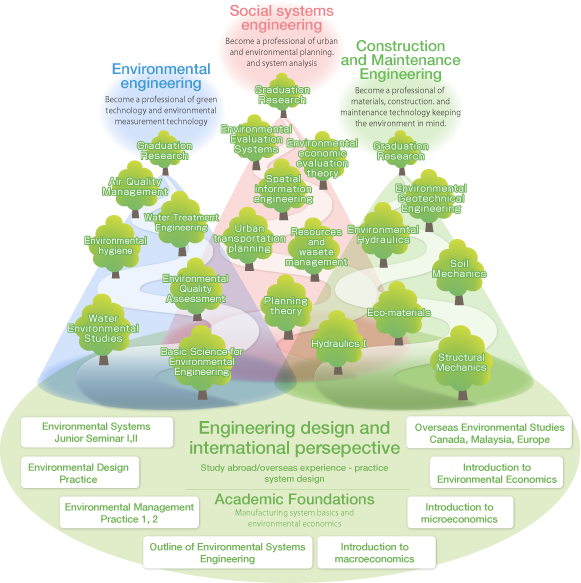
What kind of courses are offered?
Freshmen learn the basics of environmental systems engineering, while sophomores learn specialized knowledge in the field.
Juniors increase their specialized knowledge, and utilize it fully in their senior year, when they will do gradute research to solve problems in the real world.
During class there is a large amount of exercises and practical training which correspond to the lectures, so students obtain useful knowledge and powerful thinking skills.
Basic subjects
- Mathematics, physics, science, biologyunder construction
- Engineering ethicsunder construction
- Basic Environmental Mathematicsunder construction
- Information processingunder construction
- Planning
theoryunder construction - Information science Iunder construction
- Environmental statisticsunder construction
- Information science IIunder construction
- Information science IIIunder construction
Learn knowledge and gain experience through training and practice.
- Overseas Environmental Studies(Canada, Malaysia, China, Vietnam) In rapidly developing countries like China, Vietnam, and Malaysia, and already environmentally developed countries like Canada, students can learn the local environmental issues and proposed solutions firsthand.
- Environmental design training Students do ship training with the theme of “Lake Biwa”, or do groupwork with the theme of “Sustainability”, and deepen their understanding of the environment.
- CG/CAD practiceunder construction
- Information processing practiceunder construction
- Data handling practiceunder construction
- Environmental management research training I Students learn techniques of experimentation: environmental analysis, soil and hydraulics experiments, materials experiments, and practicing regional planning, based on the knowledge gained from lectures.
- Environmental management research training II Students learn techniques of experimentation: environmental analysis, soil and hydraulics experiments, materials experiments, and practicing regional planning, based on the knowledge gained from lectures.
- Facility Design Practicesunder construction
- Environmental systems specialty trainingⅠunder construction
- Environmental systems specialty trainingⅡunder construction
Courses to improve understanding of specialties related to Environmental Systems Engineering
Environmental Engineering advanced courses
- Basic Science for Environmental Engineeringunder construction
- Environmental Quality Assessmentunder construction
- Water Environmental Studiesunder construction
- Water Treatment Engineering Students learn about the different water treatment technologies and processes involved in cleaning water, a natural resource that is essential to life.
- Air Quality Managementunder construction
- Watershed and Environmental Managementunder construction
- Water and Sewage Planningunder construction
- Environmental hygieneunder construction
- Global Environmental Systemsunder construction
- Environment and Development Theoryunder construction
- Architectural Environmental Engineeringunder construction
Social Systems Engineering advanced courses
- Resources and Waste Managementunder construction
- Landscape Planningunder construction
- Environmental evaluation systemunder construction
- Urban and Regional Managementunder construction
- Urban transportation Planningunder construction
- Urban
Planningunder construction - Environmental evaluation systemunder construction
- Introduction to Environmental Economicsunder construction
- Environmental economic evaluation theoryunder construction
- Surveyingunder construction
Construction and Maintenance Engineering advanced courses
- Structural Mechanicsunder construction
- Hydraulics Ⅰunder construction
- Hydraulics Ⅱunder construction
- Exercises in Structural Mechanicsunder construction
- Exercises in Hydraulicsunder construction
- Environmental Hydraulicsunder construction
- Eco-materials Students learn fundamental properties of materials such as cement, aggregate, concrete, steel material which are used for constructional structures. Also, they learn the current measures for environmental problems and creation of a circulating society by associated industries during material production process.
- Soil
Mechanicsunder construction - Environmental Geotechnical Engineeringunder construction
- Exercises
in Soil Mechanicsunder construction - Construction and Maintenance Technologiesunder construction
Featured Subjects

Freshman year - Environmental Design Training
Students do ship training with the theme of “Lake Biwa”, or do groupwork with the theme of “Sustainability”, and deepen their understanding of the environment.
Student testimonials
In “Okishima”, which is the only freshwater lake island where people live, we were able to understand the state of the people who live side-by-side with Lake Biwa. It was really interesting. Deep water from Lake Biwa was even colder than we had thought...and delicious!
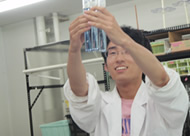
Hands-on learning - Environmental Management Training
Students learn techniques of experimentation: environmental analysis, soil and hydraulics experiments, materials experiments, and practicing regional planning, based on the knowledge gained from lectures.
Student testimonials
I performed an experiment with my own hands, so I could understand the lecture much better. Also, it was helpful to get experience in the laboratory so I could decide on what course to take after graduation.

Environmental Engineering - Water Treatment Engineering
Students learn about the different water treatment technologies and processes involved in cleaning water, a natural resource that is essential to life.
Student testimonials
I was able to learn about the basics of water processing, and water, which I used to pour down the drain without a second thought, I now know the different processes that it will undergo.
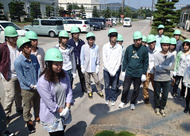
Construction Maintenance Engineering - Eco-materials
Students learn fundamental properties of materials such as cement, aggregate, concrete, steel material which are used for constructional structures.
Also, they learn the current measures for environmental problems and creation of a circulating society by associated industries during material production process.
(The photo shows a scene of the cement plant tour)
Student testimonials
We learned about the base materials that we’ve built society with: cement, steel, etc. When I watched a cement factory in class, and could see the large-scale process of manufacturing directly, it inspired me to aim to become a construction engineer.

Social Systems Engineering - Spatial information engineering
Students study urban development for the future by looking at local historical resources and using digital maps which incorporate videos and 3D media.
Student testimonials
Local information is helpful depending on how it is used, and I was able to see the breadth of information available. I want to make use of the skills I’ve gained in regional development.
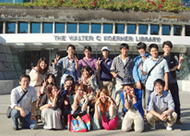
Special lecture - Overseas Environmental Studies
In rapidly developing countries like China, Vietnam, and Malaysia, and already environmentally developed countries like Canada, students can learn the local environmental issues and proposed solutions firsthand.
Student testimonials
I participated in Overseas Environmental Studies program in Canada of 2012 and had the opportunity to learn the difference between Japan’s and Vancouver’s approach to environmental policies.
The coordinated program with UBC (University of British Columbia) was especially good. On campus there are great sustainability and transportation projects which don’t exist in Japan, and listening to talks onsite in Canada was a special and rare opportunity.
Hands-on learning
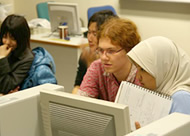
APU cooperation seminar
Students learn about local initiatives on-site in the environmental model city of Kitakyushu, in collaboration with (APU) Ritsumeikan Asia Pacific University.
Student testimonials
While learning cutting-edge environmental policy, which is attracting attention from around the world, I also had a good opportunity to meet APU’s foreign students with diverse values.
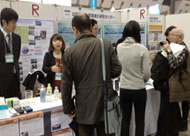
Eco-product Exhibition
Environmental Systems Engineering holds a yearly Eco-products exhibition (at Tokyo Big Sight), where results from our research are announced.
Student testimonials
I was able to organize the information I learned in my head and give a short introduction of what I’m studying to the general public. I think it’s an important to learn how to do this in order to advance my studies in the future.